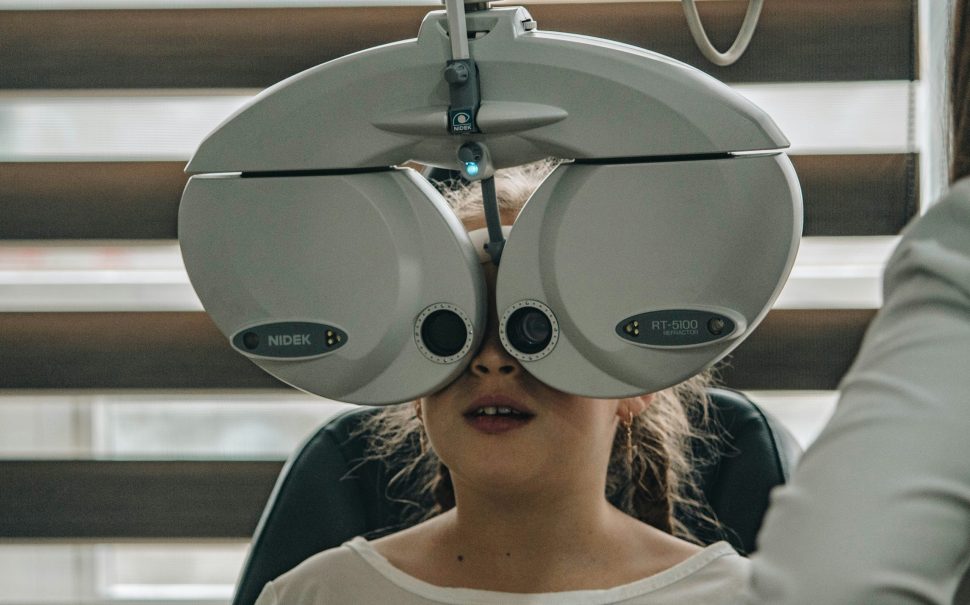The number of people receiving crucial eye-care as a result of referrals from opticians has surged in the past year, according to new NHS data.
There were only 940 admissions from a London optical site to the NHS in 2019, compared to 15,840 in 2023, demonstrating the growing recognition for the power of opticians in healthcare.
During a routine eye-test, opticians can spot general health issues such as diabetes or detect more serious conditions such as glaucoma or brain tumours, as well as a variety of eye-related issues.
Sarah Cardwell, 49 from Leeds, was diagnosed with a brain tumour after a referral from Specsavers to the eye casualty unit at St James’s University Hospital.
Sarah said: “Had I not had the eye test, it could have got to a stage where it was inoperable. I could have lost my sight because the tumour was on my optic nerve.
“People just don’t know what to look out for and how important eye-tests can be.
“I actually went back to see the optician and took her flowers and a card, which seems like nothing compared to what she did for me.
“If it wasn’t for her, who knows what would have happened.”
Thousands of patients are now being routinely referred to the NHS after eye-tests, with some admissions revealing symptomless health conditions like Sarah’s.
The large year-on-year increase in referrals to the NHS highlights how opticians are helping navigate the eye-care crisis created by Covid.
Labour recently announced that high street opticians will be utilised to help the NHS manage the demand for eye care, with waiting lists as high as 613,000 patients in July 2024.
Opticians provide an important urgent pathway in cancer diagnosis and help speed up referral times, improving earlier treatment options.
Labour conducted research that revealed patients were waiting up to five years for eye related appointments and their new focus aims to free up NHS eye specialists and help make services more accessible and convenient.
In conditions that affect the eyes or the brain, an earlier diagnosis is life changing and it is estimated that 19 million people fail to have regular eye tests in the UK.
Andrea Errington, 48, from Sunderland was diagnosed with juvenile open angle glaucoma at 14 years old despite having no symptoms or any genetic history of the disease.
Andrea said: “I had a lot to thank the optician for, because without him spotting something, I don’t think my eyesight would have been rescued.
“Its a strange sneaky disease, glaucoma, your brain fills in the missing gaps.”
Unfortunately, the pandemic added pressure to eye care services, with most being withdrawn or restricted, stopping people from having eye tests or delaying their treatments.
The overwhelming backlog created by Covid was navigated with the help of opticians such as Specsavers.
The data shows that in 2020, 775 patients were admitted to the NHS, whereas in 2021, 5,365 patients were admitted after a greater focus was placed on how optical services can help the NHS.
Specsavers Ophthalmic Director, Kingston & Surbiton, Paul Bhalla said: “The Community Urgent Eyecare Service, CUES, was set up as covid hit, it was a response to the demand of the hospitals.
“The clinical leads at all of the local hospitals in South West London, emphasised that without this service, the NHS could not cope with the demand.
“A large proportion of conditions can be mitigated, treated or controlled, but we can’t undo damage that has already been done.
“The earlier we catch the things, the better the chances are of stopping things going wrong and the better the chances of a patient maintaining great eye-health.”
The State of the UK’s Eye Health 2021 report, commissioned by Specsavers, found that referrals to ophthalmology fell by 316,000 in the period March to December 2020, this was a 28% decrease compared to 2019.
Bhalla added: “I would estimate in about one in 20 to one in 30 of sight tests we will find something that requires some kind of further involvement.
“The majority of those are not emergencies, the majority are actually fairly routine, it might be a general health condition, we might identify a patient to be potentially diabetic.”
In an aging population, it is important to recognise how missing routine eye-tests could prevent a critical earlier intervention.
Brain Tumour Research head of stakeholder relations Hugh Adams said: “We want people to know there is a route to diagnosis through an optician, however rare that is, it’s important to know.
“Your eyes are a parameter of your natural health.”
The NHS recommends that people should have an eye test every two years, with 80% of blindness being preventable if it is caught in time.
Bhalla added: “People often have a fear that they don’t want to know what is going on with them, even if people that have a slight suspicion that something might be wrong, they will not often come in to ask about it.
“That fear is a natural thing amongst all of us.”
The government’s current focus on optical sites helping the NHS means there are more services available for people to check their eye health, with many often not prioritising a routine eye-test.
Sarah noted that it was summer when she experienced blurry vision in a meeting at work and she didn’t see her optician till November that year.
Sarah added: “It was November by the time I got round to booking myself an eye test, just with life getting in the way, two kids, holidays and everything, I didn’t even think of any urgency.”
Research by Vision Express found that one in six of those under 45’s have never had an eye test, with Specsavers research finding a quarter of children haven’t either.
The data shows a significant difference between patients admitted in age groups under and over 50, with the 75-79 age group recording the most admissions.
While eye health typically deteriorates with age, the Association of Optometrists (AOP) surveyed 1,246 practising optometrists and found that “74% had seen children in the past year whose vision problems could have been treated more successfully with an earlier diagnosis”.
A 23-year-old, anonymous male from London was referred to an emergency eye-unit from Specsavers after the optician spotted that he had a detached retina during a routine eye exam.
He said: “Opticians are not just there to test your eyes, their impact on overall eye health cannot be understated.
“The optician who tested my eyes and spotted an underlying health issue had a genuinely life-changing impact.
“I’m indebted to them and I think it’s incredibly important that everyone, even those under the age of 30, get tested regularly to ensure their eyes are healthy.”





Join the discussion